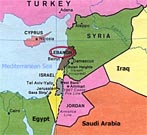Lebanese lose faith in co-existence
 Beirut - Their engagement day was supposed to be the biggest in the lives of Jad and Rouba last weekend, but it turned into a nightmare.
Beirut - Their engagement day was supposed to be the biggest in the lives of Jad and Rouba last weekend, but it turned into a nightmare.
All roads across Lebanon were closed as the country witnessed fierce clashes between the opposition led by the Shiite movement Hezbollah and the supporters of the Western-backed government of Sunni Muslim Fouad Seniora.
Jad is a Muslim Shiite who lives in a hotbed of Hezbollah's Beirut southern suburbs, and Rouba is a Sunni Muslim, who resides in the predominantly Sunni neighbourhood of Tarek Jadideh.
The latest clashes, which pitted rival Lebanese factions, occurred in Tarek Jadideh making it impossible for Jad Nasrallah to even approach the area to check on his future bride.
"I will save the engagement rings until the right moment arrives," the Lebanese daily al-Akhbar quoted Jad as saying.
For Jad there is now a new demarcation line that separates him from Rouba, a line which was established by two brothers of the same religion, namely Islam.
"The new demarcation line separates us now, even though our houses are just a few metres away," Jad said.
The Lebanese political crisis turned into deadly clashes on May 7 after the Lebanese cabinet decided to probe Hezbollah's private communication network and remove the international airport's security chief colonel Wafik Shoukair for his alleged links to Hezbollah.
Six days of fierce internal fighting has killed at least 82 people and injured about 250 others.
The showdown saw Hezbollah gunmen seize large parts of west Beirut last week, plunging an already fragile nation into fear and uncertainty.
Jad has always believed in coexistence between the Lebanese, but he never thought that a civil war would break out like it did in 1975-1990.
Many Lebanese now think that even the previous civil war which killed more than 150,000 people was not as bad as a new war in Lebanon would be, in which Muslims would be pitted against each other. From 1975 to 1990, Christians were fighting Muslims.
"The recent wars have sparked hatred among the Muslims of Lebanon, deep anger now prevails in the hearts of both sides, which will be difficult to erase even if our leaders sit and reach an agreement," said a Sunni Muslim resident of Tarek Jadideh.
Mona Sinno, a Sunni follower of the government, told Deutsche Presse-Agentur dpa: "I have always looked up to Hezbollah and their Sheikh Hassan Nasrallah for a being a resistance fighting to liberate Lebanon from Israeli occupation, but their image has changed now."
She recalled that masked Shiite men entered his mother's house in a Beirut street and destroyed the apartment because she had a picture of Sunni majority leader Saad Hariri there.
"How can we trust the resistance we backed and supported when they turned their weapons towards our chests?'" she asked.
In the nearby Barbour street, Shiite followers of house speaker Nabih Berri, expressed the same feelings towards their rivals who form the ruling majority in the country.
"How can we trust this government which is backed by the Americans not to issue decisions against our brave resistance who liberated Lebanon from the Zionists," said Fatima Berri.
"We all want to live in harmony, but with justice and fairness," she said.
"No one liked what happened in the past week, but we were obliged to defend our resistance from the wrong decisions this government is taking," she added.
But Jad and Rouba, like many others in this country, have lost hope that removing the rubble and ashes in this country would erase the prevailing hatred and have decided to eventually leave Lebanon for good. (dpa)